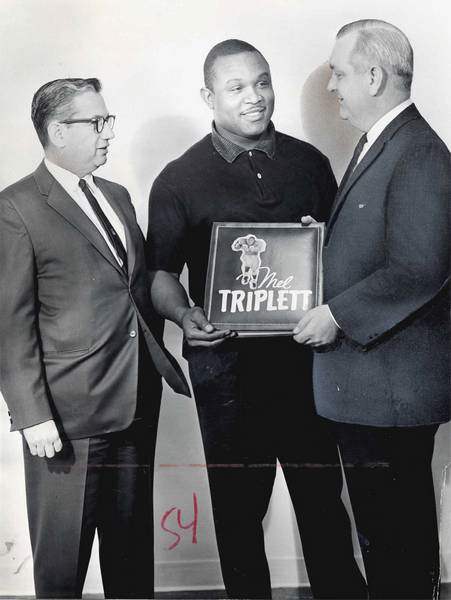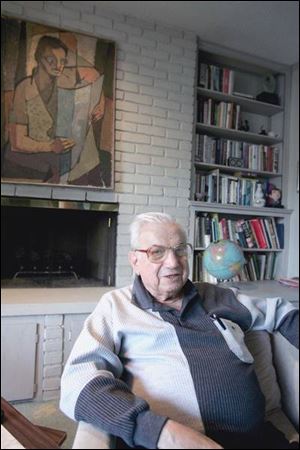
Ex-Blade writer still carries pen, paper
12/10/2006
Rothman, left, is seen here with former UT football star Mel Triplett, center, and former Blade artist Charles Beyer in 1964.

Seymour Rothman started as a sports writer at The Blade in 1936 and covered 'just about every beat' until retiring in 1991.
In Their Words is a weekly feature that appears Sundays in The Blade's sports section. Sports writer Dave Hackenberg talked with Seymour Rothman, a former Blade sports writer.
He stands just 5-foot-7, but for 55 years Seymour Rothman was one of the giants in the Toledo newspaper business.
That description might embarrass Rothman. Just doing a job, he would say.
Ah, but what a job it was.
Rothman became a Blade sports writer 70 years ago in 1936, later moved to the news side of the operation, and eventually became a features writer and columnist. In his latter role, Rothman alternated daily with the late legend Don Wolfe in penning "I've Heard," a longtime staple in the Peach Section.
Rothman covered the great coaches like Jack Mollenkopf and the great athletes like Chuck Chuckovits. Just guys, he says. And, later in his career, writing about "just guys" was his passion, and one that made his name and face among the most recognizable in town.
Rothman is 92 years old, but it seems like just yesterday that he worked the streets of a vibrant city complete with mobsters, bookies, cigar-chomping fight promoters, and burlesque halls. He remembers when downtown was "colorful and fun" and housed the finest restaurants and classiest hotels, block after block filled with department stores and theaters, and street hawkers camped on every corner peddling extra editions from any of the city's three newspapers.

Rothman, left, is seen here with former UT football star Mel Triplett, center, and former Blade artist Charles Beyer in 1964.
Rothman was born in New York City, but moved as an infant with his family to Toledo. He grew up in an era without television and when radio served as entertainment more so than as a source for news and sports information. In other words, he was part of the golden age of newspapers.
And ink started pouring through his veins at a young age. He began working for the old Toledo Times as a school correspondent during his sophomore year at Woodward High School, and would occasionally go out with reporters on assignments.
"For a few years, I was the only one who knew I wasn't on the payroll," he said with a wry smile.
While studying at the University of Toledo, Rothman worked at the Times as a copy runner on weekends and during summers.
UT didn't have a journalism program, per se, but one of his teachers was an editorial writer at The Blade.
"His name was Bill Hall," Rothman recalled, "and he told the class, 'You're all bright and you don't have to worry about failing, unless I ever find you without a piece of paper and a writing instrument.' So, to this day "
Rothman reaches into his shirt pocket and, seven decades later, pulls out a pad of paper and a pen.
"I CAME TO work at The Blade under Bob French, who was the sports editor back then. Lou Klewer, who later became well known as the outdoors writer, and Dick McGeorge were the other writers in a four-man sports department. The Blade was the big home delivery paper, the Times was the morning paper and the News-Bee had the strongest street sales. Radio hadn't developed as a real news or sports source. They didn't spend any money on it. People got all their news from newspapers.
"MY FIRST assignment was to cover high schools and I spent some time on the University of Toledo beat. The best part of the job was associating with the players and coaches. But considering the length of my career, I guess I didn't spend all that long in sports. I went to the city desk and did general-assignment reporting. I suppose at one time or another I was involved with just about every beat in the newsroom. Eventually, I went to features and then added column responsibilities. Whatever I was doing, though, it seems like I always worked some sports into it. For a long time, I wrote a sports television column.
"I loved stories that involved research and I guess I was a pretty good writer. But I think what I did best was listen. I liked it when an interview turned into a conversation.
"LOU KLEWER taught me the most valuable lesson. He said to never make the mistake that you were special or too important. He said, 'People aren't being good to you because you're you. People are good to you because you're from The Blade.'
"DON WOLFE was much more recognizable. He was a funny guy, gave great speeches, and he was a big, imposing man. When he walked into a room, everybody noticed. When I walked into a room, you noticed the other guy. But that was fine. It pretty much went along with my approach as a columnist. I was allowed to do whatever I wanted and I wasn't interested in the famous people. I wanted to write about the people who normally wouldn't get their names in the paper. I liked to write about the funny, offbeat things that happened to them.
"I THINK the best story I ever wrote, at least the one with most value to society, was a piece I did when Alcoholics Anonymous was being formed. I was working the police beat at the time I found out about it. Nothing else I ever wrote generated as many phone calls and letters as that piece did.
"MY YEARS at The Blade were very rewarding. There were good moments and bad, but was there a moment when I wanted to quit and do something else? Never, ever. If I had to do it all over again, would I do it? Yes, although I'd probably do it a lot better. I'm still reaping rewards from that job. Here I am, 92 years old, and once a week I go to lunch with a bunch of ex-jocks. Some were good, some were very good. They all played on somebody's varsity and some even played pro ball. Me? The only thing I ever played was a typewriter, yet they accept me. Everybody there has a million stories.
"It was at a luncheon that Sonny Smith, whose athletic career included coaching football at Woodward High School, revealed his strategy for getting 12 men on the field to go on defense when kicking off or punting. 'We'd get 13 guys out there. Then someone on our bench would start yelling. You've got 12 guys on the field! You've got 12 guys! Get off! Someone get off! One guy would come racing off and the play would go on. We'd have our extra man on the field.'
"Harold Mouch, a former All-City halfback at Central is a regular at the lunches and he once set some sort of record by running 175 yards for a touchdown against Scott. First, he went 50 yards to score, but the play was called back by referee Homer Hanham on an offside penalty. On the next play he went 55 yards to score again. This time a 15-yard holding penalty was called. He then went 70 yards to score. It counted."
"LOTS OF STORIES, lots of memories. It was a wonderful career, a wonderful time. Still is. If I don't have the paper right there when I sit down to breakfast, the day can't start. Things have changed with the computer and the Internet and with cable TV, but no matter what happens with the [newspaper] industry, people will always need the news gatherers."
Contact Dave Hackenberg at:
dhack@theblade.com
or 419-724-6398.